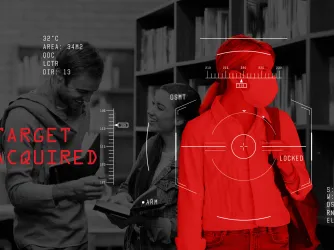Table of Contents
University Training Programs Can Misinform, Fail to Protect

2015 has been a landmark year for student activism, including for those demanding more attention be paid to the issue of rape and sexual assault on college campuses. Although this activism has helped shine light on an important issue, many of the responses by universities have undermined students’ rights in critical ways.
While FIRE has written extensively this year about the lack of due process in campus disciplinary proceedings, there is another aspect of universities’ responses that we want to call attention to: mandatory “orientations” and “training programs” that freshmen are often required to take in order to register for classes. Although universities should educate students about the applicable laws regarding sexual misconduct and sexual violence, FIRE has learned that many of these programs misinform (or, if you’re not feeling charitable, deliberately mislead) students about the state of the law. This misinformation will inevitably lead to claims of sexual misconduct that stem from legal, consensual sexual activity, increasing the number of students involved in disciplinary proceedings that, while not criminal in nature, still carry lifelong consequences and are often dangerously stacked against accused students.
John Lund-Molfese, a freshman at the University of Missouri, told FIRE about his experience with his college’s online Title IX training, which students were required to complete prior to registration. Lund-Molfese said the training contained “opinion-based questions where you’re forced to adopt a certain viewpoint in order to pass the test,” along with “questionable” facts.
He said that he believes the program was implemented so that university administrators could “say they’re doing something because there’s a lot of pressure on them”—presumably referring to pressure from the Department of Education’s Office for Civil Rights (OCR), which over the past five years has dramatically increased the number of colleges it is investigating for alleged Title IX violations while also issuing guidance requiring schools to reduce due process protections for accused students. While we cannot be sure of the motive behind the programs, screenshots of the training sent by the student to FIRE demonstrate that there is often a lack of attention to detail put into these programs, as well as a misunderstanding (or a misrepresentation) of state laws.
For example, at Mizzou, the program’s pre-test question segment informs students that “consent is generally NOT possible” if one party is “intoxicated.” According to both common sense and Missouri state law, this is blatantly untrue. Missouri, like other states, uses an incapacitation—not an intoxication—standard to negate consent. Specifically, the state defines “incapacitated” as “[t]hat physical or mental condition, temporary or permanent, in which a person is unconscious, unable to appraise the nature of such person’s conduct, or unable to communicate unwillingness to an act.” While encouraging students to err on the side of caution when obtaining consent is a positive thing, actually teaching them that all intoxicated sex is rape leaves them with a false understanding of the protections afforded to them under the law.
Lund-Molfese’s experience at Mizzou is not out of the ordinary. Three documents presented at the University of Michigan’s freshman orientation contain language specifying that one must be “sober” in order to consent. Michigan law, by contrast, states that consent is not present when an “actor knows or has reason to know that the victim is mentally incapable, mentally incapacitated, or physically helpless.” A typical student who has had two beers in an hour isn’t sober, but ordinarily, neither is he or she mentally or physically incapable of consenting to sex.
Similarly, at the State University of New York at Plattsburgh, freshmen are told at orientation that consent is “sober,” while state law says consent is not present when one individual is “mentally incapacitated.” Louisiana State University’s Title IX training states that consent cannot be obtained from parties “impaired by alcohol and/or other drugs”—but “impaired” is not defined, and any use of alcohol is impairing to some degree. A couple who shares a bottle of champagne at their wedding anniversary can most likely consent to sex with one another, even if they shouldn’t be driving. Unlike LSU, the state of Louisiana recognizes this, specifying that consent is not possible when the “victim is incapable of resisting or of understanding the nature of the act by reason of a stupor or abnormal condition of mind produced by an intoxicating agent or any cause and the offender knew or should have known of the victim's incapacity.”
By teaching that “sobriety” is necessary for consent, students are left with the assumption that sexual interactions where any alcohol was consumed beforehand constitute rape or assault. Students may not necessarily believe this to be true (their behavior, indeed, suggests they don’t). But by emphasizing an incorrect standard, colleges leave students with a warped perspective of how their experiences will be interpreted by law enforcement, as well as with the belief that they may report, for disciplinary action, a great deal of behavior that the law defines as consensual.
The typical defense of such trainings is to say that surely colleges should, or at least should be able to, teach students that sober consent is the best policy. And when it comes to what Alan Dershowitz has called the “primary question”—the ethical question—of whether “to proceed or not to proceed” with a sexual encounter, teaching people that sober consent is ideal is not in itself problematic. But, as the training materials illustrate, universities are often presenting this as factual information about when consent was or was not legally obtained. This will inevitably lead to accusations of sexual misconduct—which, in many university disciplinary systems, are overwhelmingly likely to lead to findings of responsibility—for conduct that was actually consensual.
While the media and the public commonly fall prey to misinformation, as epitomized by Rolling Stone’s publication of the now-infamous discredited rape claims by a University of Virginia student, universities must institutionally hold themselves to a higher standard, one that protects the rights of all students.
Recent Articles
Get the latest free speech news and analysis from FIRE.

FIRE statement on FCC approval of Skydance-Paramount acquisition

The mercenary spyware industry is a menace to global free expression

Smile for the surveillance state
